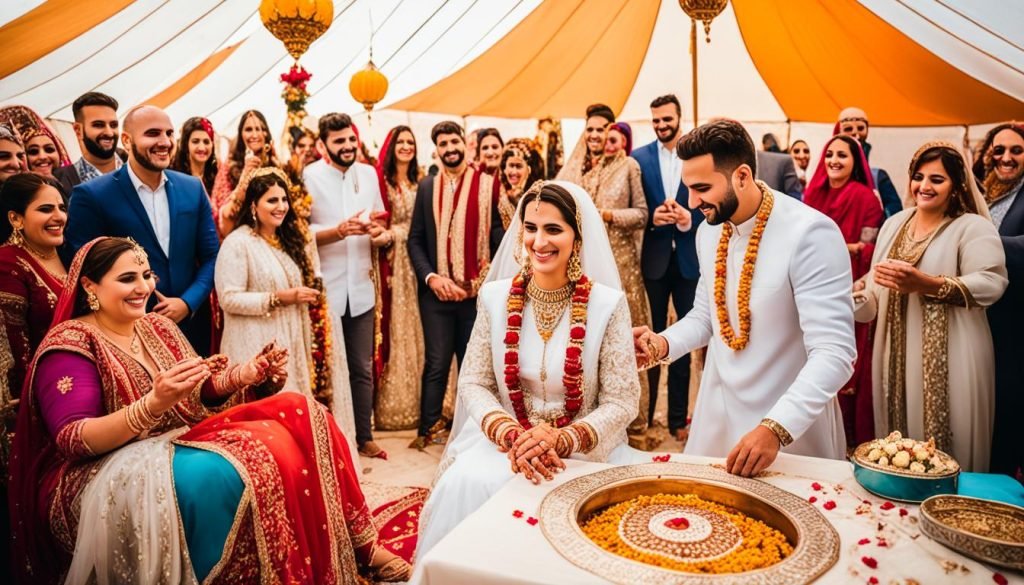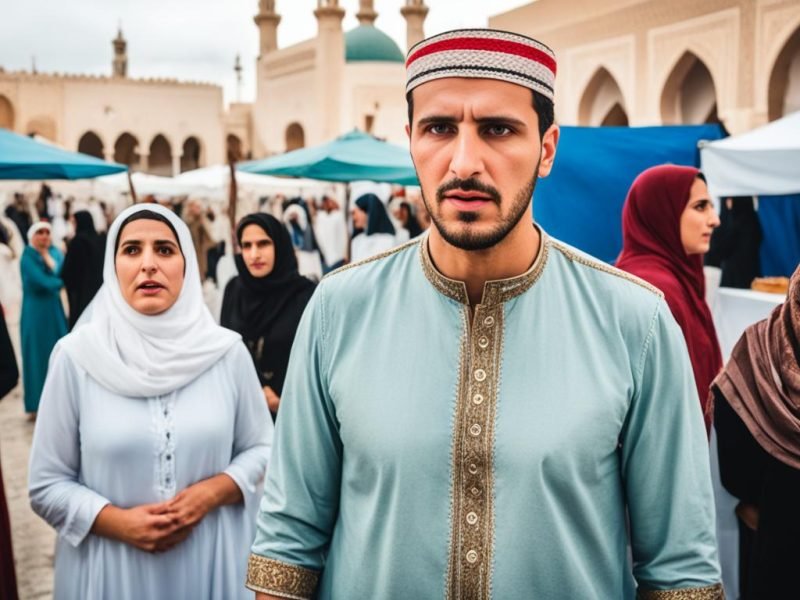In Tunisia, the rules about marriage are strict and clear. Polygamy in Tunisia is not allowed. This means you can’t legally have more than one wife. Since 1956, right when Tunisia became independent, it set this rule. This was a huge step for personal rights in the country.
Polygamy is strictly banned in Tunisia, unlike in many other Muslim countries. This shows Tunisia’s leadership in supporting women’s rights and keeping families stable. So, if you’re asking, “How Many Wives Can You Have In Tunisia?” the answer is simple. According to Tunisian marriage laws, you can only have one wife.
Key Takeaways
- Polygamy is illegal in Tunisia, unique among many Muslim-majority nations.
- Since 1956, Tunisian marriage laws have upheld a one-spouse policy.
- Violations of the polygamy ban carry severe legal repercussions.
- The Tunisian legal system on marriage emphasizes gender equality and family rights.
- For marital queries in Tunisia, including polygamy, consultation with current legal frameworks is imperative.
The History of Polygamy in Tunisia
Tunisia’s path away from polygamy is both intriguing and groundbreaking. In 1956, the country took a bold step by banning it altogether. This move set Tunisia apart from traditional Islamic marriage laws. It aimed at creating a more equal society. This pivotal change is important not only for Tunisia but also for the world. It shows progress in the reform of Islamic law.
Polygamy in Tunisia and its Ban
In the past, Tunisian men could marry up to four women if they treated them fairly and provided for them equally. But in 1956, Tunisia changed its laws to ban polygamy. This was influenced by Turkey’s earlier reforms in 1926. The change was aimed at protecting family welfare and supporting gender equality.
Comparative Overview of Other Predominantly Muslim Countries
Many Muslim countries still allow polygamy. Below is a table showing how Tunisia compares with others:
| Country | Polygamy Status | Notes |
|---|---|---|
| Tunisia | Illegal | Abolished in 1956, following modernist reforms. |
| Saudi Arabia | Legal | Permitted under Islamic law with condition of fairness. |
| Kurdistan Region (Iraq) | Restricted | Requires judicial approval since 2008, heavily regulated. |
This table shows how Tunisia’s laws stand out from those in many Islamic countries. Tunisia has taken a lead in rethinking marriage laws. It has set an example by moving away from traditional norms. Other regions are still figuring out how to balance tradition with human rights. Tunisia is a model of progressive change.
Tunisia’s Legal Framework on Marriage
Understanding Tunisian family law is key for anyone interested in the country’s marriage customs. The Personal Status Code, established in 1956, is essential in the legal framework for marriages.
The Personal Status Code of Tunisia
The Personal Status Code is crucial in Tunisia’s marriage laws. It’s a guiding framework for locals and foreigners wanting to get married in Tunisia. A major rule is that you must be at least 18 years old to marry, for both men and women. This ensures both parties are mature and ready for marriage.
Legal Capacities and Impediments for Marriage
Tunisian family law sets clear boundaries to protect people and maintain family values. Key rules include banning polygamy and marrying close kin to avoid family disputes and genetic problems. The court must okay any exceptions, making sure all unions are legal.

To clarify how Tunisia’s marriage customs and laws work together, here’s a table of the Tunisian Personal Status Code’s principal elements:
| Parameter | Detail | Impact |
|---|---|---|
| Legal Age for Marriage | 18 years for both genders | Ensures maturity and readiness for marital responsibilities |
| Polygamy | Strictly prohibited | Supports monogamy, aligning with human rights and gender equality |
| Marriage to Relatives | Close kin marriages prohibited | Prevents genetic problems and familial disputes |
| Judicial Oversight | Required for exceptions | Ensures all marital exceptions are justified and legally processed |
This approach shows Tunisia’s commitment to rights and well-being. The country’s laws create a fair legal frame for all.
Understanding Tunisia’s Stance on Polygamy
Travelers exploring international laws must grasp the Tunisian legal system on marriage. This includes knowledge about the ban on multiple wives in Tunisia. Tunisia’s laws reflect a strong commitment to modern values and protecting human rights. This is noteworthy, considering the majority of Tunisia’s populace is Muslim, who may view polygamy differently.
In Tunisia, it’s illegal to have more than one wife. There are tough penalties for breaking this rule. This makes Tunisia’s marriage laws some of the most forward-thinking in the Arab world. While many Muslim-majority countries allow polygamy, Tunisia stands out by strictly supporting monogamous marriages.
| Legal Aspect | Description |
|---|---|
| Polygamy Status | Illegal |
| Legislation Year | 1956 |
| Penalties for Polygamy | Includes fines and imprisonment |
| Cultural Impact | Significant shift towards gender equality in marriage |
The ban on multiple wives in Tunisia shows a deliberate effort to modernize the country’s laws and society. This move aims to discourage polygamy and reinforce individual rights within marriages.
“Tunisia’s marriage laws demonstrate its forward-thinking stance in a region where traditional practices are often at odds with modern interpretations of human rights.”
If you’re in Tunisia or exploring its culture, it’s vital to understand these legal nuances. Knowing about the Tunisian legal system on marriage helps in discussions about multiple wives in Tunisia. It also aids in broader conversations about human rights.
Tunisian Marriage Customs and Regulations
Tunisia is moving forward with its personal status laws. It now includes Tunisia marriage customs that consider mixed marriages in Tunisia. Since 2017, Tunisian women can marry non-Muslim foreign men. This change marks Tunisia’s move towards open and fair laws.
Mixed Marriages and Their Legality
The marriage laws have expanded. Now, more people can marry in Tunisia. This shows Tunisia’s effort to accept different cultures and encourage global relationships. The new laws show Tunisia’s aim to respect all personal and cultural backgrounds. They create a welcoming and respectful atmosphere.
Relevant Documentation for Marriage in Tunisia
Couples must gather important documents before getting married. This shows how Tunisia values legal procedures in marriages. Needed documents include birth certificates and medical certificates. They also need valid IDs to prove the process is legal.

The paperwork process is very careful and organized in Tunisia marriage customs. This is particularly true for mixed marriages in Tunisia. These steps make sure everything is legal. They also protect both people getting married. They bring clarity and accountability to the marriage.
Islamic Marriage Laws and Tunisian Adaptation
In Tunisia, religious marriage traditions have been updated to meet modern law. This shows a move away from old Islamic marriage rules. It’s a mix of honoring tradition while protecting individual rights.
Traditional Islamic Practices vs. Tunisian Family Law
Tunisian family law has adapted Islamic principles to fit today’s values. While Islamic marriage laws still influence Tunisia, the country stands out. It bans polygamy, setting it apart from other Muslim nations. This underlines Tunisia’s dedication to equality and family protection.
Reconciliation of Religion and Law
Blending religious traditions with legal reforms is key in Tunisia’s approach. This balance gives everyone equal rights, respecting both legal and cultural values.
| Islamic Principle | Tunisian Family Law Adjustment |
|---|---|
| Polygamy allowed | Polygamy banned |
| Marriage guardianship | Autonomous consent emphasised |
| Dowry prescribed | Dowry optional, with regulated guidelines |
Conclusion
When we talk about Tunisian marriage laws, we find a simple answer to How Many Wives Can You Have In Tunisia?. Tunisia stands out by saying no to polygamy. This rule supports gender equality and challenges typical views in a Muslim society. By allowing only one wife, Tunisia promotes family stability and equal rights for all.
Learning about Tunisia’s marriage laws shows its big step forward in the Arab world. If you wonder How Many Wives Can You Have In Tunisia?, know that this rule is key. It’s part of Tunisia’s push for modernity and human dignity. These laws aim to make marriage about equality and respect, following the nation’s legal rights.
Tunisia’s decision has a big impact, setting an example globally, especially in Muslim countries. The laws are strictly followed, showing serious consequences for those trying to avoid them. For anyone in or linked to Tunisia, the answer to How Many Wives Can You Have In Tunisia? shows the country’s forward-thinking values. It stands for a fair and just society for everyone.







